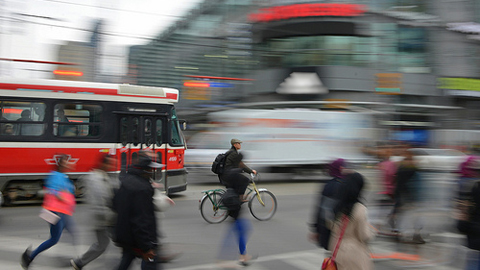
As cities around the world grow in size and influence, there is one word that increasingly irritates politicians, city workers and daily commuters – it’s one word that blocks traffic, jams crowds and stops public transit in its tracks.
Congestion.
And a new transportation research hub at the University of Toronto – led by the Faculty of Applied Science & Engineering – wants to break the bottleneck.
Earlier this week, the Engineering Faculty Council formally established the University of Toronto Transportation Research Institute (UTTRI). The new centre brings together experts from engineering, economics, policy, urban geography and planning, computer science and more from across campus.
Collaborators will engage in projects directly with industry and government organizations. Their research will address practical problems in transportation policy and decision-making, using research-based evidence. The Institute will also train highly qualified transportation personnel ready to tackle tomorrow’s challenges.
“Considerable expertise exists across U of T’s three campuses with respect to transportation, urban planning and design, urban economics and finances,” said Eric Miller (CivE), Director of the new Institute and former Director of the Cities Centre at U of T. “This expertise will be tapped as UTTRI expands beyond the Department of Civil Engineering and the Faculty of Applied Science and Engineering to become a university-wide research centre.”
UTTRI is the latest in a series of cross-disciplinary, cross-University research and education initiatives. Housed within U of T Engineering, the centre involves researchers from Engineering, the Department of Geography and Program in Planning, the Department of Computer Science, the Martin Prosperity Institute at the Rotman School of Management, the Munk School of Global Affairs and the School of Public Policy and Governance.
Interest in transportation and infrastructure research has been growing steadily across many academic disciplines in recent years, and the centralization and coordination of research from disparate areas is one major area of future opportunity.
The Institute’s formation enables the Department of Civil Engineering to expand and manage transportation-related research in a number of key areas, for example:
- The Data Management Group, which provides transportation data management services to Greater Toronto Hamilton Area (GTHA) transportation planning agencies, as well as to university transportation researchers.
- The Transportation Tomorrow Survey, the largest on-going urban travel survey in the world.
- The Travel Modelling Group, which undertakes applied research and development work to support on-going improvement in regional travel demand forecasting by GTHA transportation planning agencies.
- The Intelligent Transportation Systems Centre and Testbed, a major computer lab supporting advanced transportation system analysis and modeling.
UTTRI builds on a 40-year history at U of T Engineering in conducting research on significant Canadian transportation issues. It began with the Joint Program in Transportation, and its successor, the Urban Transportation Research and Advancement Centre.
With the University’s unrivaled facilities and vibrant transportation research community – combined with the City of Toronto’s ability to provide a unique urban laboratory – the University of Toronto Transportation Research Institute has the talent and collaborative opportunity to become the premier transportation research centre in Canada.




